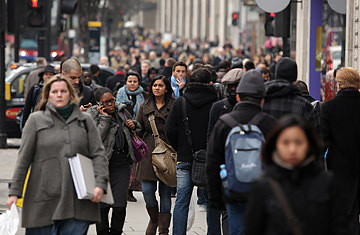
Shoppers on Oxford Street in central London, one of Britain's busiest shopping streets
The good news Tuesday, Jan. 26, was that after a year and a half of consistent economic decline, Britain announced that it had finally emerged from the recession. The downside? Its 0.1% fourth-quarter growth was not only about as small as could be but also well below what most experts had predicted. Worse still, some economists warn that the minuscule growth may be as good as the U.K. will muster for some time — and that its European neighbors aren't much better positioned to lead the region to a swift economic recovery.
Taking solace where they could, British officials hailed the official end of a recession that began in the second quarter of 2008. Though tiny, the country's fourth-quarter growth ended the nation's most severe economic slide in more than half a century — one responsible for a 6.1% decline in growth. The return to positive growth, however slight, was enough for Alistair Darling, the Chancellor of the Exchequer, to declare, "We are on a path to recovery," even if he qualified it by adding that he'll "always remain cautious."
Many economists admire Darling's optimism, though few could hide their disappointment at the 0.1% growth figure. Most had expected an 0.4% gain or more, thinking the economy would be fueled by the annual blast of Christmastime consumer spending as well as shoppers seeking to make purchases before an increase in the value-added tax went into effect in January. Though retail was one of the leading drivers of fourth-quarter growth, the boost in spending was offset by confounding slumps elsewhere in the economy.
Despite the billions the government spent on consumer-spending incentives to stimulate industrial output — like implementing cash-for-clunkers subsidies for new car buyers — the schemes didn't lead to massive growth in manufacturing. Industrial production and service-sector activities fared no better than the overall 0.1% growth figure for the fourth quarter, economists noted. "When the results were announced this morning during the meeting we were holding for the occasion, the hundreds of gathered guests all howled in derision and embarrassment at the figures they heard," says David Buik, a market analyst at the London brokerage firm BGC Partners. "It wasn't antipatriotic but rather the expression of enormous frustration at seeing so much money and effort made to stimulate economic and industrial activity for such meager returns."
Just as bad, most observers also aren't buying the hopeful government predictions that, however small the fourth-quarter growth was, renewed positive output marks the beginning of a gradual return to normal economic activity. That skepticism applies to the rest of Europe and other parts of the world as well. Analysts say that even though countries like France, Germany and the U.S. emerged from the recession months ago, their economic performances since then have remained very weak and vulnerable to setbacks. The reason? These countries returned to growth the same way Britain did: through massive infusions of state money to spur business activity.
In France, where fourth-quarter economic growth was estimated to be 0.3%, officials are now doubling their forecasts for 2010 growth from 0.75% to 1.5%, even though no new infusions of government stimulus cash are planned. Similarly, in Germany, an initial prediction of a 1.2% gain for 2010 has been revised to 1.4% — despite the country's registering a flat fourth-quarter growth figure as government stimulus funds tapered off.
Buik worries that the bright outlooks ignore the darker realities of relying on government stimulus money to restore economic growth. "Ultimately, states are going to have to cut spending and raise taxes to pay for what they've already spent," he says. "That means a period of fewer public jobs, reduced aid payments and less disposable income in consumers' pockets. Businesses will only start reinvesting money on production and jobs when they're sure demand has returned — and that isn't likely before we see government undertake cost-cutting we know is inevitable."
Although other experts largely agree that governments — and ultimately taxpayers — will end up footing a hefty bill for all the stimulus money, some don't believe this will necessarily mean that Europe's modest growth rates are doomed to slip back into the red. Eric Heyer, an economist at the French Economic Observatory in Paris, says the official forecasts of continued modest growth are feasible — although that doesn't mean an immediate recovery for many nations. Even if European economies can nurture gradual expansion, he says, most will still see unemployment continue to rise through 2010 and into next year — if companies indeed become convinced it's safe to invest again.
If that's the case, then Europeans have an entire year to wait before macroeconomic improvements spill over into the microcosms of their lives. It would also explain why Tuesday's news out of London failed to generate cheers of hope elsewhere in Europe.
